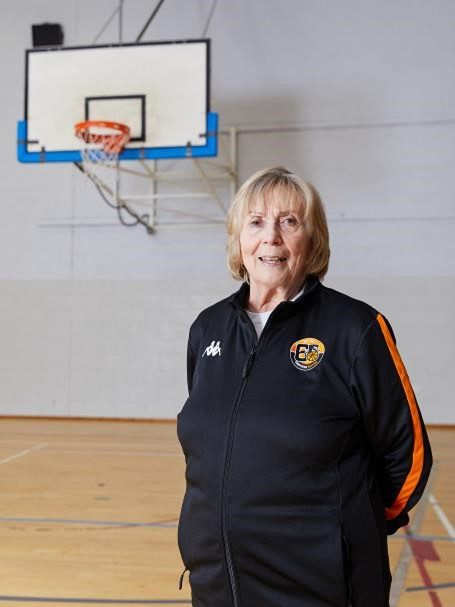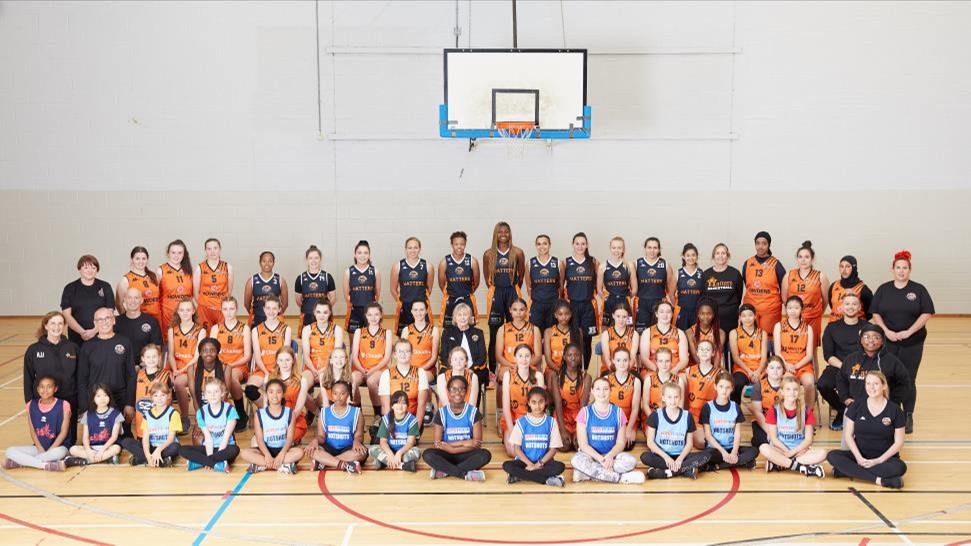
The landscape of professional women’s sport has changed in recent years like never before, blurring the lines between stereotypically male and female sports. But one of the biggest playmakers in women’s sport in England is Sheffield’s Betty Codona, a trailblazer who broke down barriers to establish women’s basketball here in the UK over sixty years ago.
Hers is a legacy of equality which has seen thousands of women and girls gain the confidence to take up a male-dominated sport – and proving they belong to be on the court. Her team, the Sheffield Hatters, was the first in the UK and has dominated English women’s basketball over the last thirty years, winning more honours than any other club in the league.
Women and girls come from near and far to be part of the Hatters family, all in awe of the history and dedication of the club. Those inspired by Betty include her own brood who have gone on to shine in their own rights; her daughters Lorraine Gayle and Vanessa Ellis went on to become accomplished players, as did granddaughter Georgia Gayle who is one of the Women’s Basketball League’s top players who has won a place in the national squad heading to EuroBasket this September.
But you could say that Sheffield Hatters was formed on the rebound.
In the early ‘60s, Betty was head of girls’ PE at Hatfield House Lane Comprehensive School in Sheffield alongside former Olympic athlete John Sherwood who was head of boys’ PE. She’d been thrust into teaching a few years previous after initially wanting to do a social studies degree at university after leaving Abbeydale Girls’ Grammar.
“To get into university I needed a year of work experience and I didn’t want an office-based role. So an uncertified teacher was suggested. At that time, you didn’t apply you were just told where you were going,” she says
Betty was first sent to Tinsley Secondary School before being moved to Burton Street School near Hillsborough.
“It was a small school with just eight teachers and when I arrived they said they’d show me to my classroom which I thought was strange. I was under the impression I was there to help, but they put me in charge of my own class. I enjoyed teaching so much that I changed my mind on a career.”
After studying at Sheffield Polytechnic, Betty started a job at Hatfield House Lane School. Her pupils included the late, great Marti Caine, or Lynne Shepherd as she was at school, and Betty remembers her turning up to a school swimming gala in a silver costume she wore for beauty contests.
At Hatfield, which would later become Firth Park Secondary School, they followed a traditional sport curriculum of netball, hockey, dance and gymnastics.
“I had gotten the girls to a good standard across the board but lessons had become boring. I introduced new sports such as aerobics, badminton and basketball, which I’d never played before but had watched a few men’s games. It probably didn’t resemble real basketball but pupils enjoyed it.

“If you give girls a chance they usually like it better than netball as there are no restricted zones, players can dribble, and it’s more physical.”
In 1961, the 14- and 15-year-old girls who Betty originally introduced basketball to were getting ready to leave school and asked Betty if she’d start a team for them at Hatfield’s night school – leading to them being called the Hatters.
“It was difficult at first as there were no other women or girls’ teams so we played in a men’s league as that’s all we could find. In the summer, we played in a netball league at British Steel’s sports ground on Bawtry Road and I remember being summoned by the committee accused of aggressive passing. Basketball is quick and straight passing rather than the one-handed loopy passes in netball.”
Another barrier the Sheffield Hatters had was kit. With them being the first team of its kind, there was an obvious absence of women’s basketball kit suppliers in the country. So the team made their own.
“We wore dresses in the early days and each player made one for themselves. We bought navy high-neck tops and shorts for underneath, but made the dress with a turquoise stripe across the middle. We also had a red pleated dress with white edging that we made.”
Gradually, women’s basketball took off. But not until Betty sent an article out to a national magazine enquiring about any other women’s teams. By 1978 – 17 years after the Sheffield Hatters was formed – there were enough women’s teams to start a national league.
Since then, the Sheffield Hatters have added on average a trophy to their collection with each new season. Betty coached a record number of 500 national league games and won 40 titles before retiring in 2009.

Today, the Sheffield Hatters’ head coach is Betty’s daughter Vanessa who is one of the brightest and most senior female coaching talents in the UK, currently working as assistant coach for Great Britain women’s basketball team. She has also been chosen as the only basketball representative out of 24 coaches chosen for UK Sport’s female coaches leadership programme to address under-representation of female coaches in high performance sports.
This season, the Sheffield Hatters have a senior team in the WBBL Championship as well as a division two team. They also have various junior teams starting from under sevens to encourage girls to take up basketball from a young age irrespective of ability. Over the years hundreds have trained and played with the club with Betty and the coaching staff, which includes her grandson Tyler Gayle, nurture the girls’ development.
“Basketball provides life skills like commitment, resilience, determination and reliability. We set a standard at the Hatters for good behaviour all round and mutual respect is given by all.”
Throughout the last sixty years, Betty has earned respect from everyone around her, not only for her work on the court but also to keep the club alive against all odds through years for fundraising.

“There just isn’t enough money in grassroots sport. But basketball appeals to children from ethnic minorities and disadvantaged backgrounds, so affordability is often a big problem. We’ve always fundraised so that we don’t have to turn players away.”
None more so than last season, their 60th year, when the club’s future was thrown into doubt. Owing to the pandemic, club funds resulted in the Hatters being withdrawn from the WBBL – not the anniversary they deserved. Vanessa went to Austria to coach and many players were forced to find a substitute club for the season or miss out on playing.
But Betty wasn’t about to see the club she’d spent sixty years building just fold. Through gallant efforts, the team raised over £100,000 to pay their overheads and recruit new players, enabling them to re-join the league for the 2021/22 season.
Thankfully, the WBBL team is back to its winning ways, with Sheffield Hatters veterans like Helen Naylor, Naomi Campbell and Georgia Gayle playing alongside new recruits like USA born Mari Stewart and Cypriot Elysa Ioannou. They’re hoping to add another trophy to their tally of 65 as the season comes to a close in May.
And with generation after generation of players rising through the ranks, long may the Sheffield Hatters reign supreme as the epitome of women’s ambition in sport.

For more about the Sheffield Hatters, visit www.sheffieldhatters.com






